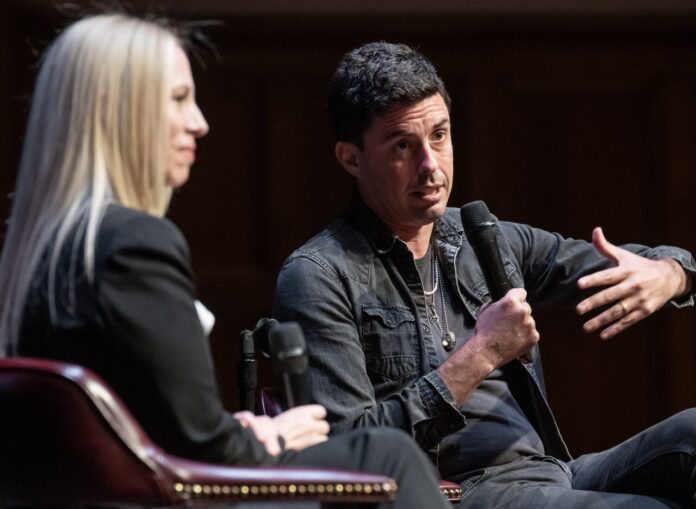Tim Miller — a political strategist for Republicans John Huntsman in 2012 and Jeb Bush in 2016, who sought their party’s presidential nomination unsuccessfully — spoke with Gender, Women and Sexuality Studies Professor Caroline Heldman as Occidental’s annual Jack Kemp ’57 Distinguished Lecturer Oct. 21.
Miller, now an MSNBC analyst, podcast host and writer-at-large for The Bulwark, said that as a young person in politics before 9/11, he was attracted to the Republican Party’s “free markets,” “free people” and idea of America as a shining city on a hill that people aspire to come to.
Miller said that at that time, he had a lot of friends who were Democrats and that “the stakes didn’t feel quite as high.”
“There was very little political disagreement, and that’s kind of the era I grew up in,” Miller said. “And I say that not to excuse myself, really, but as the reality of how myself and the world [worked] […] I look back on that with kind of some shame, and definitely some regret.”
Miller said he began to see himself “as a cog in something he didn’t feel good about” with Sarah Palin’s vice presidential nomination in 2008.
“By the time Trump came around in 2015, it just wasn’t a close call for me, and I found him repugnant in every way,” Miller said. “He did not do any of the things that had originally appealed to the party — he didn’t fit that for me.”
Jack Kemp, the lecture’s namesake, was a star quarterback at Occidental and in the American Football League before becoming a congressman in New York, serving as George H. W. Bush’s Housing and Urban Development Secretary and the Republican vice presidential nominee in 1996.
After his death in 2009, Kemp was eulogized as a “compassionate conservative” and awarded the Presidential Medal of Freedom by Barack Obama.
According to political scientist Steven Teles, compassionate conservatism “sought to advance traditionally liberal ends by conservative means.”
“Kemp argued that Republicans could attract votes from racial minorities through authentically conservative policies such as enterprise zones, school vouchers and selling public housing to tenants,” Teles writes.
During the Q&A section of Miller’s talk, a Trump supporter voiced his displeasure with the Democratic Party and criticized Miller for being a ‘Never Trumper.’ Other audience members voiced their disagreement.
Miller responded by saying that if tech companies want a carveout from Trump’s tariffs, they have to go to the Oval Office and grovel to the President.
“I think we’d all know what to call that, which is a state-run economy, and socialism,” Miller said.
Kemp — who cosponsored the 1981 Reagan tax cuts for individuals and businesses — “wouldn’t like that very much,” according to Miller.
Miller said Trump’s immigration policy is not a part of the conservative tradition in any way.
“I also don’t think [Kemp] would like very much the way Donald Trump is treating people that are coming to this country,” Miller said. “And having masked thugs jump out of cars and grab them when they’re gardening.”
Miller told The Occidental he does not feel hopeful.
“I think that we’re in a pretty dark period in our politics, and also in the overlap between politics and the tech oligarchy,” Miller said. “It’s absolutely necessary for people to care and engage and push back on this right now, and do so through the traditional liberal democratic process.”
According to Miller, people feel like they can only respond to the right’s authoritarian movement through a left authoritarian movement.
“Our whole system ends up deteriorating, and I think the only way to stop that is to fight through the system and push these guys back and it might not work,” Miller said. “It’s not guaranteed to work, but that’s our only choice — to try.”
Contact James Miller at jmiller4@oxy.edu
![]()






























